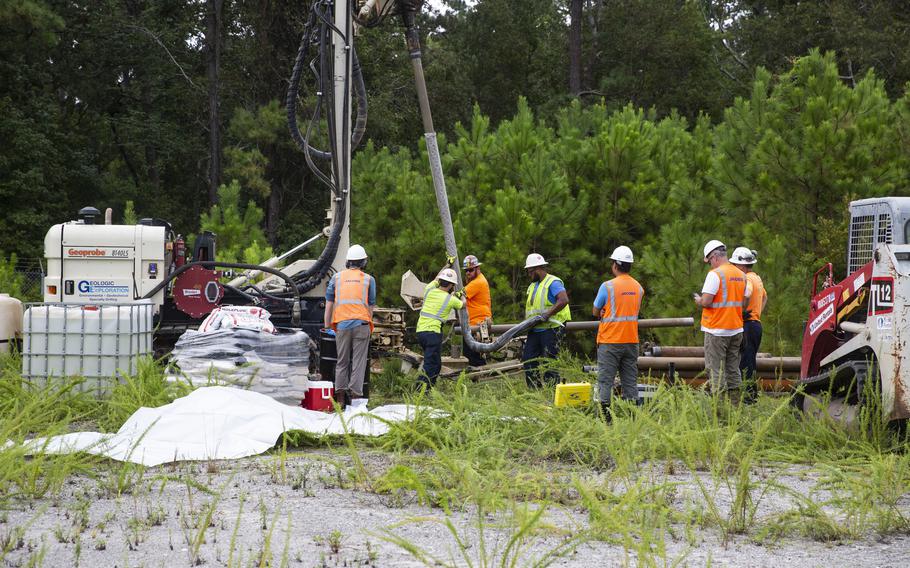
Navy contractors use a sonic drill to install a groundwater monitoring well to gather soil and water samples to be tested for per- and polyfluoroalkyl substances, or PFAS, on Marine Corps Base Camp Lejeune, N.C., in August 2020. PFAS are man-made chemicals commonly used for clothing, food packaging and carpeting and have the potential to be toxic. (Christian Ayers/U.S. Marine Corps)
The Pentagon’s efforts to clean up contamination of toxic PFAS — so-called forever chemicals — at hundreds of military bases nationwide is moving too slowly and could linger for 50 years without an influx of funds, environmental advocates said Monday.
The Defense Department has failed to keep pace with the rising costs of PFAS cleanup at its current and former bases, where chemicals — mostly from foam used for decades to fight fires — have leached into groundwater, the Environmental Working Group said in a new report.
The estimated cost to mitigate PFAS contamination across the Defense Department has grown by billions of dollars in recent years, but the department’s annual budget requests to address contamination have not kept pace, the group said.
“We’re calling the escalating backlog a ticking time bomb because based on current trajectories, DOD’s cleanup challenge will become increasingly difficult, if not impossible, to overcome without substantial increases in funding,” said Jared Hayes, a senior policy analyst at EWG, a nonprofit group based in Washington that specializes in research and advocacy in agricultural subsidies, toxic chemicals, drinking water pollutants, and corporate accountability. “Current cleanup funding cannot possibly catch up to rising cleanup obligations.”
Per- and polyfluoroalkyl substances, or PFAS, are known as forever chemicals because they build up in human bodies and never break down in the environment. The national Centers for Disease Control and Prevention states human health effects are uncertain, but some research has linked the chemicals to increased risks for cancer, reproductive and immune system harm, among other diseases.
The Pentagon in March requested about $1.5 billion in funding for contamination cleanup at its current and former bases, some $700 million less for those efforts than Congress provided the Defense Department for fiscal 2023. The EWG on Monday recommended lawmakers give the Pentagon $2.75 billion for contamination cleanup in fiscal 2024, which starts Oct. 1.
John Reeder, the EWG’s vice president for federal affairs, blasted the budget request, saying the problem will continue to get worse without immediate intervention. He said even as the Pentagon sought fewer funds for clean up next year, its own estimates for long term cleanup costs grew by billions of dollars in recent years.
“The costs are going up because DOD waited too long to look into the PFAS contamination, which they knew was there decades ago,” Reeder told reporters Monday. “As that contamination is confirmed, and they start to engineer solutions, the costs are going to escalate extraordinarily quickly in the next few years.
“This crisis is getting bigger. It’s not getting better.”
Pentagon officials did not immediately respond Monday to questions about EWG’s report.
The Pentagon has said it will cost at least $31 billion to address PFAS at known contamination sites. Officials have confirmed PFAS contamination at 397 current or former DOD locations, including at least one in all 50 states. More than 300 additional locations are suspected of PFAS contamination, according to EWG.
The longer that it takes to address the contamination, the more costly clean up fees will be, Reeder said.
“Not only do [people face] prolonged potential exposure if these cleanups are delayed, but PFAS spreads, and so you have a larger area that might become contaminated,” he said. “Then, you might have additional systems that are impacted, water supplies are impacted. So, time is definitely not on our side. It needs to be dealt with urgently.”
Reeder said the EWG hears almost constantly from military and veteran families concerned about PFAS exposures and who question how seriously the military is working to address the issue.
“We've heard over and over that, you know, ‘We are military families. We’ve always seen that military installation is the lifeblood of our community, and this issue has turned us into adversaries’ [of the military],” he said. “They don’t want to be adversaries. So, that issue of trusting the military, I think, is a serious issue, and we urge DOD to consider that.”